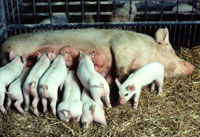health
-
Michelle Nijhuis reviews Six Modern Plagues and How We Are Causing Them
It's easy to look at disease outbreaks as acts of God, or fate, or chance. After all, diseases are often so capricious, so stubbornly beyond our full control, that it can seem as if we humans have little to do with them -- beyond suffering the consequences, that is. But in many cases, argues journalist and veterinarian Mark Jerome Walters, we have far more influence over disease than we think. In Six Modern Plagues and How We Are Causing Them, he contends that disease outbreaks are often triggered by the damage we've done to the environment.
-
How many international environmental treaties can one administration sabotage?
From just about anywhere you are on the planet, the city of Punta Arenas, Chile, is very, very far away. Perched on the banks of the Strait of Magellan, Punta Arenas is bounded on the north by the ice fields of Patagonia, a place that the combined forces of nature and the outdoor-gear industry have […]
-
Make your Thanksgiving and holiday meals go easy on the Earth
Sharpen your knives and hone your appetite — it’s that time of year again. Every fall, we stuff ourselves at Thanksgiving, take a quick break, then fill up again over the winter holidays, sometimes gorging at event after event to accommodate multiple sets of family and friends. But environmentalists, beware: The industry set up to […]
-
Hollow Weenies
EPA Won’t Restrict Use of Potentially Harmful Weed Killer Talk about scary stuff: On Oct. 31, as people across the U.S. were getting ready to don costumes and pass out Halloween candy, the Bush administration announced that it would not impose new restrictions on the commonly used herbicide atrazine, which has been associated with low […]
-
Umbra on eco-friendly birth control
Dear Umbra, I am wondering about the most environmentally safe form of birth control. From what I understand, women’s birth control pills put terrible amounts of hormones into the world’s waters and cause genetic mutations in fish. On the other hand, constantly using and discarding plastic condoms, including the packaging these come in, does not […]
-
Umbra on Roundup
Dear Umbra, I have a large, organic (hopefully) vegetable garden. However, I occasionally use Roundup around the edges to keep invasive grasses from creeping in. Now, I have been given to understand that Roundup is relatively safe and breaks down almost immediately. What are your thoughts on this subject? I totally trust your judgment. BetsyMichigan […]
-
Genetically modified animals could make it to your plate with minimal testing — and no public input
Last January, inspectors with the U.S. Food and Drug Administration paid a visit to the University of Illinois, where researchers have been studying the DNA of pigs. The pig project, based in Champaign-Urbana, is one of dozens of experiments being conducted across the country in which scientists are altering the genetic structure of animals in […]
-
How to avoid the enviro nasties that lurk in pools
Let water sit around for 24 hours — stagnating in an old tire, say, or in a birdbath in the backyard — and some pretty nasty things can start breeding in it. After Mt. St. Helen’s erupted in Washington State in 1980, newly formed oxygen-deprived pools became breeding grounds for Legionnaires’ disease. Then there’s cholera, […]
-
Is contaminated housing poisoning military families?
Karen Strand was six in 1958 when her family moved into a house on the Camp Lejeune military base in North Carolina. It wasn’t until 2000 that she made the connection between her ongoing health problems — a bleeding ulcer at 19, thyroid and parathyroid problems, depression, and cysts and tumors that necessitated a complete […]

